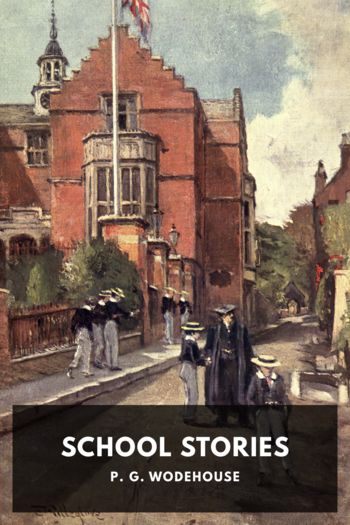School Stories, P. G. Wodehouse [adventure books to read .TXT] 📗

- Author: P. G. Wodehouse
Book online «School Stories, P. G. Wodehouse [adventure books to read .TXT] 📗». Author P. G. Wodehouse
—Your ever,
A. Venables
VIIFrom Mr. John Dalgliesh to Mr. Philip Mortimer, of Penge:
Dear Sir—In reply to your letter of the 18th inst., I shall be happy to recommend your son, Reginald, for the vacant post in the firm of Messrs Van Nugget, Diomonde, and Mynes, African merchants. I have written them to that effect, and you will, doubtless, receive a communication from them shortly.
—I am, my dear sir, yours faithfully,
J. Dalgliesh
VIIIFrom Richard Venables, of St. Austin’s, to his father Major-General Sir Everard Venables, V.C., K.C.M.G.:
Dear Father—Uncle John writes, in answer to my apology, to say that no apologies will meet the case; and that he has given his nomination in that rotten City firm of his to a fellow called Mortimer. But rather a decent thing has happened. There is a chap here I know pretty well, who is the son of Lord Marmaduke Twistleton, and it appears that the dook himself was down watching the Rugborough match, and liked my batting. He came and talked to me after the match, and asked me what I was going to do when I left, and I said I wasn’t certain, and he said that, if I hadn’t anything better on, he could give me a place on his estate up in Scotland, as a sort of land-agent, as he wanted a chap who could play cricket, because he was keen on the game himself, and always had a lot going on in the summer up there. So he says that, if I go up to the ’Varsity for three years, he can guarantee me the place when I come down, with a jolly good screw and a ripping open-air life, with lots of riding, and so on, which is just what I’ve always wanted. So, can I? It’s the sort of opportunity that won’t occur again, and you know you always said the only reason I couldn’t go up to the ’Varsity was, that it would be a waste of time. But in this case, you see, it won’t, because he wants me to go, and guarantees me the place when I come down. It’ll be awfully fine, if I may. I hope you’ll see it.
—Your affectionate son,
Dick
P.S.—I think he’s writing to you. He asked your address. I think Uncle John’s a rotter. I sent him a rattling fine apology, and this is how he treats it. But it’ll be all right if you like this land-agent idea. If you like, you might wire your answer.
IXTelegram from Major-General Sir Everard Venables, V.C., K.C.M.G., to his son Richard Venables, of St. Austin’s:
Venables, St. Austin’s. Very well.—Venables
XExtract from Letter from Richard Venables, of St. Austin’s, to his father Major-General Sir Everard Venables, V.C., K.C.M.G.:
… Thanks, awfully—
Extract from The Austinian of October:
The following O.A.s have gone into residence this year: At Oxford, J. Scrymgeour, Corpus Christi; R. Venables, Trinity; K. Crespigny-Brown, Balliol.
Extract from the Daily Mail’s account of the ’Varsity match of the following summer:
… The St. Austin’s freshman, Venables, fully justified his inclusion by scoring a stylish fifty-seven. He hit eight fours, and except for a miss-hit in the slips, at 51, which Smith might possibly have secured had he started sooner, gave nothing like a chance. Venables, it will be remembered, played several good innings for Oxford in the earlier matches, notably, his not out contribution of 103 against Sussex—
Harrison’s Slight ErrorThe one o’clock down express was just on the point of starting. The engine-driver, with his hand on the lever, whiled away the moments, like the watchman in The Agamemnon, by whistling. The guard endeavoured to talk to three people at once. Porters flitted to and fro, cleaving a path for themselves with trucks of luggage. The Usual Old Lady was asking if she was right for some place nobody had ever heard of. Everybody was saying goodbye to everybody else, and last, but not least, P. St. H. Harrison, of St. Austin’s, was strolling at a leisurely pace towards the rear of the train. There was no need for him to hurry. For had not his friend, Mace, promised to keep a corner seat for him while he went to the refreshment room to lay in supplies? Undoubtedly he had, and Harrison, as he watched the struggling crowd, congratulated himself that he was not as other men. A corner seat in a carriage full of his own particular friends, with plenty of provisions, and something to read in case he got tired of talking—it would be perfect.
So engrossed was he in these reflections, that he did not notice that from the opposite end of the platform a youth of about his own age was also making for the compartment in question. The first intimation he had of his presence was when the latter, arriving first at the door by a short head, hurled a bag on to the rack, and sank gracefully into the identical corner seat which Harrison had long regarded as his own personal property. And to make matters worse, there was no other vacant seat in the compartment. Harrison was about to protest, when the guard blew his whistle. There was





Comments (0)